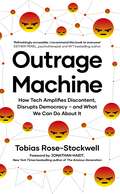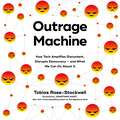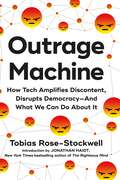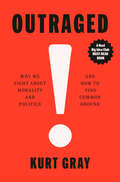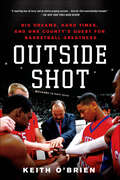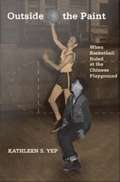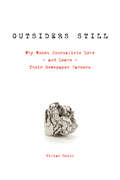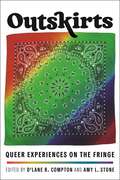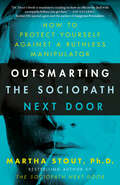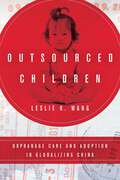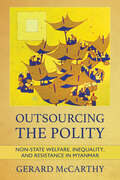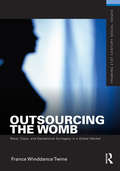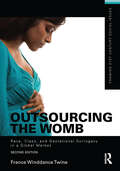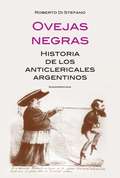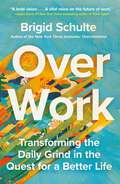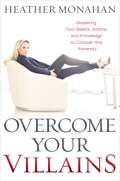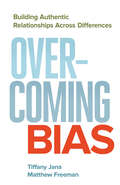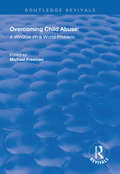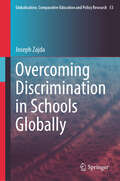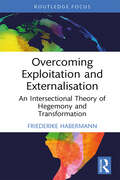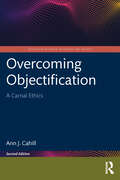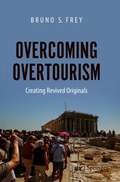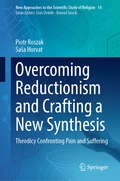- Table View
- List View
Outrage Machine: How Tech Amplifies Discontent, Disrupts Democracy – and What We Can Do About It
by Tobias Rose-StockwellForeword by Jonathan Haidt, author of THE RIGHTEOUS MINDAn invaluable guide to understanding the technology that captures our attention with anger.The original internet was not designed to make us upset, distracted, confused, and outraged. But something unexpected happened at the turn of the last decade, when a handful of small features were quietly launched at social media companies with little fanfare. Together, they triggered a cascading set of dramatic changes to how media, politics, and society itself operates-inadvertently creating an Outrage Machine we cannot ignore.Author, designer, and media researcher Tobias Rose-Stockwell shares the defining shifts caused by these technologies, and how they have ignited a society-wide crisis of trust. Drawing from cutting-edge research and vivid personal anecdotes, Rose-Stockwell illustrates how social media has bound us to an unprecedented system of public performance, training us to react rather than reflect, and attack rather than debate.OUTRAGE MACHINE reveals the triggers and tactics used to exploit our anger, unpacking how these tools hack our deep tribal instincts and psychological vulnerabilities, and how they have become opportunistic platforms for authoritarians and a threat to democratic norms everywhere.But this book is not just about the problem. In a story spanning continents and generations, Rose-Stockwell explores how every new media technology disrupts our ability to make sense of the world, from the printing press to the telegraph, from radio to television. OUTRAGE MACHINE situates social media within a historical cycle of confusion, violence, and emerging tolerance. Using clear language and powerful illustrations, this book reveals the magnitude of the challenges we face, while offering realistic solutions and a promising pathway out.
Outrage Machine: How Tech Amplifies Discontent, Disrupts Democracy – and What We Can Do About It
by Tobias Rose-StockwellForeword by Jonathan Haidt, author of THE RIGHTEOUS MINDAn invaluable guide to understanding the technology that captures our attention with anger.The original internet was not designed to make us upset, distracted, confused, and outraged. But something unexpected happened at the turn of the last decade, when a handful of small features were quietly launched at social media companies with little fanfare. Together, they triggered a cascading set of dramatic changes to how media, politics, and society itself operates-inadvertently creating an Outrage Machine we cannot ignore.Author, designer, and media researcher Tobias Rose-Stockwell shares the defining shifts caused by these technologies, and how they have ignited a society-wide crisis of trust. Drawing from cutting-edge research and vivid personal anecdotes, Rose-Stockwell illustrates how social media has bound us to an unprecedented system of public performance, training us to react rather than reflect, and attack rather than debate.OUTRAGE MACHINE reveals the triggers and tactics used to exploit our anger, unpacking how these tools hack our deep tribal instincts and psychological vulnerabilities, and how they have become opportunistic platforms for authoritarians and a threat to democratic norms everywhere.But this book is not just about the problem. In a story spanning continents and generations, Rose-Stockwell explores how every new media technology disrupts our ability to make sense of the world, from the printing press to the telegraph, from radio to television. OUTRAGE MACHINE situates social media within a historical cycle of confusion, violence, and emerging tolerance. Using clear language and powerful illustrations, this book reveals the magnitude of the challenges we face, while offering realistic solutions and a promising pathway out.
Outrage Machine: How Tech Amplifies Discontent, Disrupts Democracy—And What We Can Do About It
by Tobias Rose-StockwellAmazon's Best History Book of the Month for July 2023An invaluable guide to understanding how the internet has broken our brains—and what we can do to fix it. The original internet was not designed to make us upset, distracted, confused, and outraged. But something unexpected happened at the turn of the last decade, when a handful of small features were quietly launched at social media companies with little fanfare. Together, they triggered a cascading set of dramatic changes to how media, politics, and society itself operate—inadvertently creating an Outrage Machine we cannot ignore. Author, designer, and media researcher Tobias Rose-Stockwell shares the defining shifts caused by these technologies, and how they have ignited a society-wide crisis of trust. Drawing from cutting-edge research and vivid personal anecdotes, Rose-Stockwell illustrates how social media has bound us to an unprecedented system of public performance, training us to react rather than reflect, and attack rather than debate.Outrage Machine reveals the triggers and tactics used to exploit our anger, unpacking how these tools hack our deep tribal instincts and psychological vulnerabilities, and how they have become opportunistic platforms for authoritarians and a threat to democratic norms everywhere. But this book is not just about the problem. In a story spanning continents and generations, Rose-Stockwell explores how every new media technology disrupts our ability to make sense of the world, from the printing press to the telegraph, from radio to television. Outrage Machine situates social media within a historical cycle of confusion, violence, and emerging tolerance. Using clear language and powerful illustrations, this book reveals the magnitude of the challenges we face, while offering realistic solutions and a promising pathway out.
Outraged: Why We Fight About Morality and Politics and How to Find Common Ground
by Kurt GrayA groundbreaking new perspective on the moral mind that rewrites our understanding of where moral judgments come from, and how we can overcome the feelings of outrage that so often divide usIt&’s easy to assume that liberals and conservatives have radically different moral foundations. In Outraged, Kurt Gray showcases the latest science to demonstrate that we all have the same moral mind—that everyone&’s moral judgments stem from feeling threatened or vulnerable to harm.We all care about protecting ourselves and the vulnerable. Conflict arises, however, when we have different perceptions of harm. We get outraged when we disagree about who the &“real&” victim is, whether we&’re talking about political issues, fights with our in-laws, or arguments on the playground.In this fascinating and insightful tour of our moral minds, Gray tackles popular myths that prevent us from understanding ourselves and those around us. While it is commonly believed that our ancestors were apex predators, Gray argues that for the majority of our evolutionary history, humans were more hunted than hunter. This explains why our minds are hard-wired to perceive threats, and provides surprising insights on the scientific origins of our values and beliefs. Though we might think ourselves driven by objective reasoning, Gray unveils new research that finds our moral judgments are based on gut feelings rather than rational thought, and presents a compelling reminder that we are more alike than we might think.Drawing on groundbreaking research, Gray provides a captivating new explanation for our moral outrage, and unpacks how to best bridge divides. If you want to understand the morals of the &“other side,&” ask yourself a simple question—what harms do they see?
Outside Shot: Big Dreams, Hard Times, and One County's Quest for Basketball Greatness
by Keith O'BrienOutside Shot is the acclaimed true story of a small-town team and an American community struggling for redemption, called "a reporting tour de force" and "utterly gripping" by The New York TimesThe Cardinals of Scott County High School were beloved once--and with good reason. For years, the boys and their legendary coach gave fans in central Kentucky, deep in the heart of basketball country, just what they wanted: state titles, national rankings, and countless trips to Kentucky's one-of-a-kind state tournament, where winning and losing can change a young man's life.But in 2009, with the economy sputtering, anger rising, and Scott County mired in a two-year drought, fans had begun to lose faith in the boys. They weren't the heroes of Scott County anymore; they were "mini-athlete gods," haunted by dreams, burdened by expectations, and desperate to escape through the only means they knew: basketball.In Outside Shot, Keith O'Brien takes us on an epic journey, from the bluegrass hills and broken homes of rural America, to inner-city Lexington, to Kentucky's most hallowed hall: Rupp Arena, where high school tournament games are known to draw twenty-thousand people, and where, for the players and their fans, it feels like anything is possible.The narrative follows four of the team's top seniors and their coach as they struggle to redeem themselves in the face of impossible odds: once-loyal fans now turned against them, parents who demand athletic greatness, and scouts who weigh their every move. It delves deep inside the lives of the boys, their families, and their community--divided along lines of race, politics, religion, and sports. And it chronicles not only the high-stakes world of Kentucky basketball, but the battle for the soul of small-town America.A story of inspiration and poignancy, filled with moments of drama on and off the court, Outside Shot shows that if it's hard to win basketball games, it can be even harder to win at life itself.
Outside the Paint: When Basketball Ruled at the Chinese Playground
by Kathleen S. YepThis fascinating book reveals that Chinese Americans began "shooting hoops" nearly a century before Chinese superstar Yao Ming turned pro. Drawing on interviews with players and coaches, Outside the Paint takes readers back to San Francisco in the 1930s and 1940s, when young Chinese American men and women developed a new approach to the game--with fast breaks, intricate passing and aggressive defense--that was ahead of its time. Every chapter tells a surprising story: the Chinese Playground, the only public outdoor space in Chinatown; the Hong Wah Kues, a professional barnstorming men's basketball team; the Mei Wahs, a championship women's amateur team; Woo Wong, the first Chinese athlete to play in Madison Square Garden; and the extraordinarily talented Helen Wong, whom Kathleen Yep compares to Babe Didrikson. Outside the Paintchronicles the efforts of these highly accomplished athletes who developed a unique playing style that capitalized on their physical attributes, challenged the prevailing racial hierarchy, and enabled them, for a time, to leave the confines of their segregated world. They learned to dribble, shoot, and steal.
Outsiders Still
by Vivian SmithDespite years of dominating journalism school classrooms across North America, women remain vastly underrepresented at the highest levels of newspaper leadership. Why do so many female journalists leave the industry and so few reach the top?Interviewing female journalists at daily newspapers across Canada, Vivian Smith - who spent fourteen years at The Globe and Mail as a reporter, editor, and manager - finds that many of the obstacles that women face in the newspaper industry are the same now as they have been historically, made worse by the challenging times in which the industry finds itself. The youngest fear they will have to choose between a career and a family; mid-career women madly juggle the pressures of work and family while worrying that they are not "good mothers"; and the most senior reflect on decades of accomplishments mixed with frustration at newsroom sexism that has held them back.Listening carefully to the stories these journalists tell, both about themselves and about what they write, Smith reveals in Outsiders Still how overt hostility to women in the newsroom has been replaced by systemic inequality that limits or ends the careers of many female journalists. Despite decades of contributions to society's news agenda, women print journalists are outsiders still.
Outskirts: Queer Experiences on the Fringe
by D'Lane R. Compton Amy L. StoneCelebrates diverse queer experiences on society’s marginsOutskirts addresses the diverse and intricate aspects of the queer experience on the periphery of the social world. From the Korean spa to the Carnival krewe to new sexual identities, this volume asks important questions about the atypical places, spaces, and identities that are an important part of LGBTQ life in the United States. By bringing together scholars specializing in the less visible facets of queer culture, the book offers valuable insights that contribute to a deeper understanding of queer perspectives and their impact on the discipline of sociology. The volume challenges researchers to focus on diversity and complexity of the queer experience in the fringe to inform larger sociological questions and contribute to the field of sociology. Most simply put: what is it that we learn from studying at the margins?The essays in Outskirts focus on the influence of place, both physical and virtual, within institutional settings and in situations of placelessness. This attention to non-normative spaces and identities enriches the collective knowledge of LGBTQ experiences and offers a compelling narrative that pushes the boundaries of sociological inquiry and highlights the importance of queer voices on the fringes of society.
Outsmarting the Sociopath Next Door: How to Protect Yourself Against a Ruthless Manipulator
by Martha StoutFrom Dr. Martha Stout's influential work The Sociopath Next Door, we learned how to identify a sociopath. Now she tells us what we actually can do about it.While the best way to deal with a sociopath is to avoid him or her entirely, sometimes circumstance doesn't allow for that. What happens when the time comes to defend yourself against your own child, a ruthless ex-spouse, a boss or another person in power? Using the many chilling and often heartbreaking emails and letters she has received over the years, Dr. Martha Stout uncovers the psychology behind the sociopath's methods and provides concrete guidelines to help navigate these dangerous interactions. Organized around categories such as destructive narcissism, violent sociopaths, sociopathic coworkers, sociopathy in business and government, and the sociopath in your family, Outsmarting the Sociopath Next Door contains detailed explanation and commentary on how best to react to keep the sociopath at bay. Uniting these categories is a discussion of changing psychological theories of personality and sociopathy and the enduring triumph of conscience over those who operate without empathy or concern for others. By understanding the person you're dealing with and changing the rules of the game, you'll be able to gain the upper hand and escape the sociopath's influence. Whether you're fighting a custody battle against a sociopathic ex or being gaslighted by a boss or coworker, you'll find hope and help within these pages. With this guide to disarming the conscienceless, Dr. Stout provides an incisive new examination of human behavior and conceptions of normality, and gives readers the tools needed to protect themselves.
Outsourced Children: Orphanage Care and Adoption in Globalizing China
by Leslie K. WangIt's no secret that tens of thousands of Chinese children have been adopted by American parents and that Western aid organizations have invested in helping orphans in China--but why have Chinese authorities allowed this exchange, and what does it reveal about processes of globalization? Countries that allow their vulnerable children to be cared for by outsiders are typically viewed as weaker global players. However, Leslie K. Wang argues that China has turned this notion on its head by outsourcing the care of its unwanted children to attract foreign resources and secure closer ties with Western nations. She demonstrates the two main ways that this "outsourced intimacy" operates as an ongoing transnational exchange: first, through the exportation of mostly healthy girls into Western homes via adoption, and second, through the subsequent importation of first-world actors, resources, and practices into orphanages to care for the mostly special needs youth left behind. Outsourced Children reveals the different care standards offered in Chinese state-run orphanages that were aided by Western humanitarian organizations. Wang explains how such transnational partnerships place marginalized children squarely at the intersection of public and private spheres, state and civil society, and local and global agendas. While Western societies view childhood as an innocent time, unaffected by politics, this book explores how children both symbolize and influence national futures.
Outsourcing the Polity: Non-State Welfare, Inequality, and Resistance in Myanmar
by Gerard McCarthyOutsourcing the Polity offers a new account of social outsourcing in post-independence Myanmar, demonstrating how the bankrupt post-socialist junta mediated market reform in the 1990s and 2000s and forced private and non-state actors to take the burden for social welfare. Informed by research during Myanmar's decade of partial civilian rule (2011–2021), Gerard McCarthy examines how ideals and practices of non-state welfare can both sustain democratic resistance and undermine social reform over time. Rather than expand government-led social action funded by direct taxation, grassroots activists and democratic leaders after 2011 variously framed government social action as ineffective, undesirable, and even corrosive of civic norms. They instead encouraged citizens to be "self-reliant" and support each other, including during disasters. Powerful tycoons filled the social gap, using public philanthropy to remake their reputations and to defend their ongoing expropriation of land and state assets from potential democratic redistribution. With non-state social actors more important than ever following Myanmar's return to dictatorship in 2021, Outsourcing the Polity casts new light on the lasting legacies of outsourcing for distributive politics.
Outsourcing the Womb: Race, Class and Gestational Surrogacy in a Global Market
by France Winddance TwineA quiet revolution has been taking place during the past three decades. The way that children enter families has changed radically among upper middle class families. In the 1980s infertility increasing became defined as a medical problem that could be solved with assisted reproductive technologies (ART) rather than through adoption. Asexual or ‘assisted conception’ involving medical technologies such as in vitro fertilization and embryo transfers began to replace sexual reproduction for infertile couples. Third parties, referred to as surrogates are hired to assist individuals and/or couples who wish to conceive and child with whom they share a genetic tie. This has resulted in a ‘surrogate baby boom.’ Outsourcing the Womb provides a critical introduction to the global surrogacy market. A comparative analysis of the assisted reproductive technology and surrogacy industry in Egypt, Israel, India and the United States disentangles the intersecting roles of race, religion, class inequality, religious law, and global capitalism. Gestational surrogacy challenges the idea of ‘natural’ reproduction and of the meaning of parenthood. What role should the state play in providing individuals and families with access to reproductive technologies? This book concludes with a discussion of ‘reproductive justice’. The goal of this new, unique series is to offer readable, teachable "thinking frames" on today’s social problems and social issues by leading scholars, all in short 60 page or shorter formats, and available for view on http://routledge.customgateway.com/routledge-social-issues.html For instructors teaching a wide range of courses in the social sciences, the Routledge Social Issues Collection now offers the best of both worlds: originally written short texts that provide "overviews" to important social issues as well as teachable excerpts from larger works previously published by Routledge and other presses.
Outsourcing the Womb: Race, Class and Gestational Surrogacy in a Global Market (Framing 21st Century Social Issues)
by France Winddance TwineThrough case studies, Outsourcing the Womb, Second Edition provides a critical analysis and global tour of the international surrogacy landscape in Egypt, India, China, Japan, Israel, Ukraine, the European Union and the United States. By providing a comparative analysis of countries that have very different policies, this book disentangles the complex role that race, religion, class inequality, legal regimes, and global capitalism play in the gestational surrogacy market. This book provides an intersectional frame of analysis in which multiple forms of social inequality and power differences become institutionalized and restrict the access of some individuals and families while privileging others, and concludes with a discussion of "reproductive justice" and "reproductive liberty." It is an ideal addition to courses on social problems, race, gender, and inequality.
Ovejas negras: Historia de los anticlericales argentinos
by Roberto Di StefanoEl abordaje de un tema casi virgen en nuestra historiografía, a travésde un relato accesible al público no especializado. ¿Dónde buscar las raíces del anticlericalismo argentino? ¿Se trata, comoquiere la historiografía católica, de una ideología «foránea», arribadaa estas playas durante el impío siglo XIX de la mano de masones,socialistas y anarquistas? ¿Por qué un país que se dice y consideracatólico vio arder sus iglesias en varias oportunidades? ¿Qué vínculosmedian entre la política, los conflictos de clase y el anticlericalismoen la Argentina contemporánea? ¿Cómo vivieron los anticlericales lasagrada lucha contra su inveterado enemigo? ¿Por qué el anticlericalismoparece ser un rasgo prevalentemente masculino? ¿Por qué perdióprotagonismo y visibilidad pública en los últimos cincuenta años de lavida del país?
Over Work: Transforming the Daily Grind in the Quest for a Better Life
by Brigid Schulte“Brigid Schulte is a vital voice on the future of work, and her carefully researched book lights the way to fewer hours, less stress, and more meaning.” ―Adam Grant, #1 New York Times bestselling author of Think Again and Hidden Potential, and host of the podcast WorkLifeFrom the New York Times bestselling author of Overwhelmed, a deeply reported exploration of why American work isn’t working and how our lives can be made more meaningfulFollowing Overwhelmed, Brigid Schulte’s groundbreaking examination of time management and stress, the prizewinning journalist now turns her attention to the greatest culprit in America’s quality-of-life crisis: the way our economy and culture conceive of work. Americans across all demographics, industries, and socioeconomic levels report exhaustion, burnout, and the wish for more meaningful lives. This full-system failure in our structure of work affects everything from gender inequality to domestic stability, and it even shortens our lifespans.Drawing on years of research, Schulte traces the arc of our discontent from a time before the 1980s, when work was compatible with well-being and allowed a single earner to support a family, until today, with millions of people working multiple hourly jobs or in white-collar positions where no hours are ever off duty. She casts a wide net in search of solutions, exploring the movement to institute a four-day workweek, introducing Japan’s Housewives Brigade—which demands legal protection for family time—and embedding with CEOs who are making the business case for humane conditions. And she demonstrates the power of a collective and creative demand for change, showing that work can be organized in an infinite number of ways that are good for humans and for business.Fiercely argued and vividly told, rich with stories and informed by deep investigation, Over Work lays out a clear vision for ending our punishing grind and reclaiming leisure, joy, and meaning.
Overcome Your Villains: Mastering Your Beliefs, Actions, and Knowledge to Conquer Any Adversity
by Heather MonahanWhether you&’re facing the glass ceiling, a toxic work environment, or anything in between, limit-breaking female founder Heather Monahan&’s 3-Step BAK process will help you evaluate and eliminate any outside or self-defeating blockers between where you are now and where you deserve to be.If you&’ve ever felt alone, down, defeated, or discouraged—this book&’s for you.If you&’ve ever been unsure of your next move or felt your confidence slip just when you needed it the most—this book is definitely for you.Author and entrepreneur Heather Monahan will help you learn the easy but remarkable steps you can take to overcome the negative people and other challenges we all encounter at work and at home, find real and lasting happiness, and achieve the success you deserve in your career and in your personal life.Growing up in poverty, Heather leapfrogged the tremendous obstacles in her life to reach the pinnacle of success in business—only to lose it all when she was fired by the villain who was her new boss. She has seen the worst of the worst when it comes to the destruction a toxic workplace can have on someone&’s perception of themselves and their outlook for the future. In these pages, she lights the beacon on your path towards stepping into and then stomping out your fear to reach your full potential—regardless of the level of trauma you&’ve experienced or are currently experiencing in your workplace.Overcome Your Villains will help you learn:Heather&’s 3-Step BAK process to evaluate your situation and identify a clear path forward.How to deal with (or overcome) a toxic environment, whether that be at work, at home, or in your own head.All the options you have to reach your full potential, and how to immediately start pursuing them.
Overcoming Bias: Building Authentic Relationships across Differences
by Matthew Freeman Tiffany JanaControl, Conquer, and Prevail! Everybody's biased. The truth is, we all harbor unconscious assumptions that can get in the way of our good intentions and keep us from building authentic relationships with people different from ourselves. Tiffany Jana and Matthew Freeman use vivid stories and fun (yes, fun!) exercises and activities to help us reflect on our personal experiences and uncover how our hidden biases are formed. By becoming more self-aware, we can control knee-jerk reactions, conquer fears of the unknown, and prevail over closed-mindedness. In the end, Jana and Freeman's central message is that you are not the problem—but you can be the solution.
Overcoming Child Abuse: A Window on a World Problem (Routledge Revivals)
by Michael FreemanPublished in 2000. Child abuse is endemic, it comes in many forms and its categories are not closed. This book looks at responses to aspects of child abuse in all five continents. The definitions are different, though not all that different, the legal emphases vary and so do management techniques. This book reveals the importance of culture and structure in the commitment to eradicate the problem.
Overcoming Discrimination in Schools Globally (Globalisation, Comparative Education and Policy Research #53)
by Joseph ZajdaThis book focuses on global research findings dealing with various forms of visible discrimination in the classroom. The synthesis of research evidence suggests that intelligence discrimination, race and ethnicity discrimination, social class discrimination, labeling students according to their academic achievement, and the self-fulfilling prophecy (SFP) have a powerful impact on students’ self-esteem, engagement, motivation and their academic achievement. Research findings also demonstrate a positive correlation between teachers’ perception of their students’ abilities and students’ actual performance in the classroom. The book analyses and critiques recent research findings dealing with major forms of discrimination in schools, discriminatory practices, their impact on students, and implications for the student’s social identity, self-esteem, and academic achievement. Finally, the book offers relevant and valid strategies for overcoming unacceptable levels of discrimination in schools. This book serves as a sourcebook of ideas for researchers, educators, practitioners and policy makers specializing in the areas of globalisation, performance culture, and discrimination in schools. It offers an overview of education policy reforms and strategies for eliminating discrimination in schools and enhancing authentic education reforms, designed to provide the equality, quality of education for all.
Overcoming Exploitation and Externalisation: An Intersectional Theory of Hegemony and Transformation (Critiques and Alternatives to Capitalism)
by Friederike HabermannAdvancing an intersectional theory of hegemony, this book shows how various power relations interact through capitalist structures of othering. Going beyond the usual critiques of capitalism, it analyses the market itself as a principal cause of various forms of externalisation and domination. The book therefore calls for a dismantling of the market and its competitive economic structures through a transformation of the economy from below, greater democratisation (not least for the empowerment of suppressed identities), and the creation of commons as spaces based on inclusion rather than exclusion. In doing so, Overcoming Exploitation and Externalisation argues that co-operative possibilities can emerge for the transformation of ourselves and our society. It will therefore appeal to scholars and students of social and political theory with interests in the commons and alternatives to capitalism.
Overcoming Objectification: A Carnal Ethics (Routledge Research in Gender and Society)
by Ann J. CahillThe second edition of Overcoming Objectification: A Carnal Ethics provides a critical analysis of the widely used (particularly in feminist philosophy) concept of objectification, and offers a new concept (derivatization) in its stead.Cahill suggests an abandonment of objectification due to the concept’s dependence on a Kantian ideal of personhood, an ideal that fails to recognize sufficiently the role the body plays in personhood and results in an implicit vilification of the body and sexuality. Phenomena associated with objectification are ethically problematic not because they render women objects, and therefore not-persons, but rather because they construct feminine subjectivity and sexuality as wholly derivative of masculine subjectivity and sexuality. Women are not objectified as much as they are derivatized: turned into a mere reflection or projection of the other. Cahill argues for a sexual ethics grounded in difference, carnality, and intersubjectivity. The preface to the second edition traces new scholarly contributions to conversations regarding sexual ethics, feminist engagements with Kant, intersectionality, and trans philosophy.With original and far-reaching insights regarding the structure of gender inequality, this work will be of interest to students and scholars in the humanities and social sciences alike and will be of particular use to those interested in sexual ethics, sexual assault, and dominant media representations of gendered bodies.
Overcoming Obstacles and Finding Success: The Power of Performance Psychology
by Emily Pica Kevin R. HarrisThis valuable book identifies common obstacles in any endeavor that can impact on success and offers highly accessible exercises to help readers overcome them. Featuring expertise from dozens of high-level performers regarding their journey to the top of their domain, it offers practical advice on how to separate yourself from your competition and stand out from the crowd.All performers, whether beginners or world class, in sports, business, the arts, and beyond, have encountered obstacles in their careers. Acknowledging that every successful person must work hard, this book offers a blueprint for those wanting to map out their own success based on over twenty years of research into performance, and the authors’ experiences of guiding career development among their mentees and teaching courses on the topic. Each chapter includes a case study that exemplifies one of the most common obstacles individuals face in their efforts to be successful, including topics like impostor syndrome, artificial ceilings, facing rejection, and not allowing for rest or recovery. Following this, the chapter goes on to provide a series of engaging exercises for readers to reflect on their own performance and techniques, and enables them to strategize ways they can modify their performance to achieve better results. Throughout, the book is underpinned by theoretical frameworks from performance psychology, clear actionable steps for achieving success, and suggested readings for further study.Written with career development in mind, the applications of this book are far-reaching, with relevance for all those looking to excel in their chosen fields.
Overcoming Overtourism: Creating Revived Originals
by Bruno S. FreyCultural Overtourism is a comparatively new term, and refers to historical sites, museums and places that are extremely crowded by tourists; hence, a type of tourism that has negative effects on both the cultural sites and the people who live there. This problem has sparked more and more protests. Accordingly, many cultural institutions and cities are now taking measures to limit the flow of tourists. In this book, Bruno S. Frey - a renowned and frequently cited economist - suggests, on the contrary, an extension of the supply of cultural sites in the form of “Revived Originals”. By this he means the erection of identical replicas of the most important buildings at a suitable nearby location. In addition, digital information technologies (augmented and virtual reality including holograms) can be used to immerse visitors in the history and culture of the newly established sites, while adjacent hotels, restaurants and shops provide the necessary accompanying infrastructure. In this way, the flow of tourists can be distributed between the original site and the Revived Original. This book outlines the “Revived Originals” concept, discusses the organisational and economic challenges it entails, and contrasts it with existing Disneyland concepts. Especially for families with children or people who have little interest in culture - i.e., for the majority of visitors - these places can be very attractive. This book will appeal to anyone interested in alternative forms of tourism, as well as political and administrative decision-makers looking for new solutions to cultural overtourism.
Overcoming Reductionism and Crafting a New Synthesis: Theodicy Confronting Pain and Suffering (New Approaches to the Scientific Study of Religion #14)
by Piotr Roszak Saša HorvatThis book explores and sheds light on the contemporary discourse between science and religion. Employing the methodological approach of modern science, Overcoming Reductionism aims to explain natural phenomena not in isolation from philosophical or theological interpretations. The book then focuses on the concept of pain. Although pain is a phenomenon familiar to all humans, defining it exclusively in terms of nociception proves challenging. This book therefore delves into the intricate nature of the phenomenon, critically acknowledging the way pain profoundly influences the construction of one's existential meaning, particularly concerning matters of faith.
Overcoming Resistance: A Practical Guide to Producing Change in the Workplace
by Jerald M. Jellison"A clear, concise, and useable guide to making change happen." - Martha Gates, Vice President, Pacific Mutual Life Insurance
